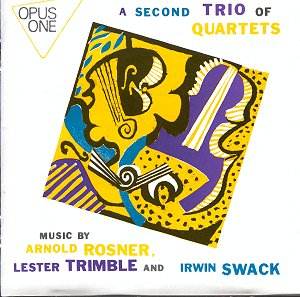Max Schubel founded Opus One with the objective of issuing recordings
of the richly diverse works of living American composers. His own Third
Quartet is on Opus One CD151. This present assemblage represents challenging
listening.
Rosner is at his most prickly in the Fourth Quartet with
his accustomed fastidious expression and tragic inclination here magnified
by highly intense drama. This piece ties in with his much later opera
Chronicle of Nine. Stylistic alliances flit briefly across the
auditory horizon: Shostakovich in his later quartets, Bartók
and even RVWís Tallis. The Trimble work has a much higher
incidence of dissonance than the Rosner. A pupil of Copland, Honegger
and Milhaud he seems to have gone down the road of Coplandís Piano
Fantasy. An intriguing piece but decidedly thorny.
Ohio-born Irwin Swack was a name completely unknown to me. A
pupil of Vittorio Giannini (always a promising connection) he seems
to have been drawn to the music of Shostakovich and Bartók. These
voices and the deftly astringent lyricism of the Berg Violin Concerto
have each infused the horizontal and vertical grid of this music. He
is most assuredly of a romantic inclination and I will continue to look
out for his name.. There are three other quartets, Psalm VIII for
tenor and string orchestra, two symphonies and a Fantaisie Concertante
for string orchestra. While his ideas are not, on this evidence,
indelible he promises much.
Each of the three works are performed by a different quartet and,
apropos of nothing apart from an additional nugget of background, each
of the quartets is all-female.
The curious should note that the first trio of quartets was issued on
Opus One CD105 with music by Laurie Macgregor, Richard Samuel and Eliot
Sokolov. The Hampshire Quartet recorded all three.
De rigueur listening for twentieth century quartet specialists.
Impressive for the gritty Rosner and the promising Swack.

![]() Alorian (Rosner); Ondine
(Trimble); Sierra (Swack).
Alorian (Rosner); Ondine
(Trimble); Sierra (Swack). ![]() OPUS ONE 150CD [69.33]
OPUS ONE 150CD [69.33]